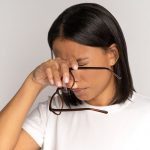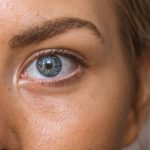Top Eye Health Tips and Habits to Practice in Your Life
We rely on our eyes so much. Poets described them as our windows to the world. Honor your eyes with some of our favorite eye health tips. We wish you and your family a lifetime of healthy vision.
Please keep in mind that the following tips are purely for health education purposes. They are general advice that nearly anyone can benefit from. However, they do not serve as a replacement for professional care from a qualified eye doctor or optometrist.
Your daily habits influence the health and comfort of your eyes. These eight tips are the starting point for an eye-healthy lifestyle. By the way, you may notice that many of these eye health tips are good for your overall health, not just your eye health!
Eight Top Eye Health Tips For Every Day
Here are eight top eye health tips for everyday eye care:
Eat An Eye-Healthy Diet
Nutrients from your food help keep your eyes healthy. Some important nutrients for healthy vision include omega-3 fatty acids, zinc vitamin E, lutein, vitamin A, and vitamin C.
To consume these nutrients, try eating:
- Oily fish like salmon
- Green leafy vegetables like kale or spinach
- Protein like nuts, eggs, legumes
- Citrus fruits
If you have trouble eating enough eye-healthy foods, consider whether supplements may be right for you. Be sure to discuss any supplements you are taking or considering with your eye doctor and your primary care physician.
Protect Your Eyes From the Sun
The sun’s UV radiation is a top cause of premature aging and damage. UV exposure increases the likelihood of cataracts and macular degeneration. Whenever you are outside during daylight, try to wear a pair of sunglasses that protect against 99-100% of both UV-A and UV-B rays.
Also, consider wearing a brimmed hat to physically shade your eyes from sun damage.
Practice Eye-Safety at Work and Play
If you play contact sports or racket sports like Squash, goggles help protect you from an eye injury. Similar applies to sports that involve flying debris like motorcycling or mountain biking.
In addition, be careful with any chores or work involving chemicals or debris. We recommend that you wear safety glasses during the following activities:
- Mowing the lawn or yard work
- Working in a laboratory
- Woodworking, metal crafting, soldering
- Construction work
Avoid Smoking and Tobacco Use
If you smoke, consider quitting. Smoking contributes to damage of the optic nerve, cataracts, and macular degeneration. Avoiding or ceasing smoking is one of the best things you can do for all aspects of your health including your vision health.
Minimize Computer (Or Phone) Eye Strain
If you are like many people, you spend hours each day staring at computer monitors, LED TVs, and smartphones. People often forget to blink leading to dry eye and eye strain. Also, excessive blue light exposure may disrupt sleep and contribute to eyestrain.
Practice the 20-20-20 technique to prevent fatigue.
- Every 20 minutes take a break from looking at your screen or monitor
- Focus on a non-digital object that is at least 20 feet away
- Do this for at least 20 seconds.
Some patients find that using night mode decreases the eye strain resulting from blue light. Also adjusting monitors to comfortable brightness and resolution settings help.
Whenever possible, enjoy activities that don’t involve screen time.
Practice Healthy Eye Hygiene
If you wear contact lenses, good hygiene is essential to your health and vision. Always follow your eye doctor’s advice on cleaning, handling, and caring for your contact lenses. Apply and remove them in a clean environment after thoroughly washing your hands. Finally, replace them as recommended so if your contact lenses are 30-day lenses replace them once as scheduled.
Cosmetic products also may introduce harmful bacteria to the eyes. Never share eye makeup like mascara with other people and replace your mascara every three months to avoid bacteria buildup. If you get an eye infection like pink eye, throw away all your eye makeup and use fresh products once your infection is completely healed.
Finally, avoid touching your eyes more than necessary and wash your hands first if you must touch your eyes.
Listen to Your Eyes
If you notice any changes to your vision, contact your eye doctor to schedule an examination. Early diagnosis leads to early treatment. The earlier an eye health condition is treated the greater the probability of preventing unnecessary vision loss. Medicine has advanced rapidly in recent decades, new and innovative treatments are constantly developed.
Vision changes are not the only thing to watch out for. If you notice eye itchiness or discomfort of any kind, contact your eye doctor’s office. Seasonal allergies, hormonal changes, and infection are among the many things that may cause dryness, itchiness or eye pain. Sometimes the underlying condition is mild and resolves itself quickly but in rare cases, new discomfort may indicate a serious undiagnosed vision-threatening condition. Listen to your eyes and seek medical attention for any symptoms that cause pain, discomfort or that otherwise concern you.
Finally, make notes about your family history since some vision health concerns have an element of hereditary factors. Inform your eye doctor about any family issues impacting vision. Also, be aware that some health conditions, like diabetes, can damage the eyes or even cause blindness. If you are diabetic or prediabetic seek the appropriate treatments or lifestyle changes to manage the disease. This positively affects all aspects of your health and quality of life.
Visit Your Eye Doctor as Recommended
One of our top eye health tips is to visit your eye doctor as recommended for your age and life circumstances. Even if you don’t need prescription lenses, a thorough examination is essential for early detection, diagnosis, and treatments of serious vision health conditions. Some of these conditions, like glaucoma, often lack obvious early symptoms. However, if diagnosed soon enough, your eye doctor may prescribe treatment to prevent damage to the eyes or vision loss.
If you are a Charlotte-area resident who is due for a vision exam, contact us to schedule one today.





